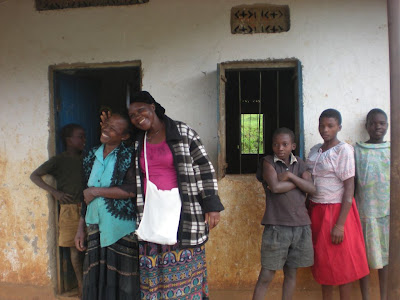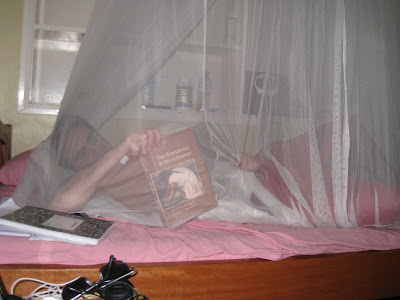Look at me, I am Good! (Part 1)
I have at all costs resisted talking about my work here in Africa in any way shape or form. I guess one could take this as an admission that I don't actually do any work at all. The truth is that I actually work reasonably hard- certainly not as hard as if I were in the US getting paid, but harder than my neighbors or any of the government people we interact with. There are a couple reasons I don't talk much about the work: (1) I think it's unprofessional (and I'm nothing if not a consummate professional and model worker bee at all times) and (2) the nature of community work and working in Africa in general is that its incredibly frustrating and seemingly pointless on a day to day basis. Nothing works as planned and everything reverts to chaos, especially when working with the community. I could easily fill pages and pages with bitching about broken appointments and the minutia of my day, but that would be neither fun to read nor to write- so what's the point.
Lately though, We're finally seeing the results of the months and months of work. Partly its a change in gears from me and the people around me, and partly its just success begets effort. So without further ado: a kind of ingenuous, sort of unforced account of how successful and awesome my organization is. It's super long, so I broke it into two parts.
As some know, in May Pat and I cut the stakes on Lira where our project was originally based and showed up on the doorstep of Mbale with absolutely nothing of value and no clue. Our good friend and associate Fred at MUBS business school in Kampala, recommended that we meet his mother in law, who runs a community savings group called a SACCO right in town. We looked her up in late May and found that she lived not two blocks from our house. When we arrived, Mbale United Women’s Association (MUWA) had fallen into dormancy. The accounting was in a state of disrepair and the books hadn’t been updated in several months. The chairwoman Veronica had lost the motivation to continue on and was planning her resignation. The members saved sporadically at best, and meetings were few and far between. In a word, MUWA was broken.
Veronica was overjoyed at the prospect of working with two silly looking white dudes in golf pants, and Patrick and myself were lucky enough to meet with her daily for months building a personal relationship and organizational partnership. A normal day was sitting down with her in her workspace and just talking while helping with whatever tasks she thought were idiot proof enough for us not to mess up. We ground g-nuts, we washed simsim, we pounded millet. But mostly we just talked and plotted and schemed about how to fix MUWA. We interviewed the members as often as we could to develop an idea for how we could actually make a difference and help these women in ways that they themselves value. As the weeks past Veronica became energized by our presence and started to clear the cobwebs from MUWA and bring it back into operation.
We decided that the best way to provide something of value to these women was through training. That's another long story for another day, but in short we got disallusioned with the microfinance model and it became clear to us that in Uganda, people need education more than they need loans. So we set out to start teaching business skills education. Today was the 10th week of the 12 week training program we developed for MUWA using materials from the Freedom from Hunger Project, a bussiness skills training organization out of UC Davis. During the first month we covered “Planning a Better Business,” which focused on planning skills and the fundamentals of business. Next, we jumped into “Manage your Business Money,” where we really dug into separating business and personal money, calculating profits, and tracking expenditures and income. Currently we are covering “Increase your Sales,” focusing on customer care, marketing, and pricing. Outside of the trainings, my roommate Jaime spends her week visiting the women at their businesses and working one-on-one to help them use a basic cashbook and develop business plans.
Many of the members have found our training to be extremely valuable, and there is always a small crowd packed in the little space in Veronica’s house where we hold the trainings. From the beginning, several of the women have been taking our training to heart and really making an all out effort to implement their new knowledge and skills. One of the biggest and yet easiest things we provide for our clients is the sense of empowerment and efficacy they get from knowing they have a team of the brightest minds from Kampala and American expatriates at their back.
One member, Gertrude, is one of our brightest success stories. In the short time since we began trainings, Gertrude has given her stationary shop a facelift and revamped her whole business. In just two months, Gertrude has increased her MUWA savings deposits by over ten times. Another member, Veronica, has taken to heart our lessons on planning for unexpected events and capital budgeting, and increased her purchases of raw materials from 10 kg per harvest to over 300 kgs. Veronica has been steadily putting money into her MUWA savings account each and every week, and is well on her way to her goal of owning her own factory producing her porridge flour, groundnut butter (like peanut butter) and other dried goods. Josephine is another member that deserves recognition. Like Gertrude and Veronica, Josephine has really taken our training to heart and pledged herself to improving her business practices. Josephine has been a model for the other members of the benefits of saving and reinvesting profits into her small drugshop. Small entrepreneurs everywhere can learn from Josephine's example showing that it doesn’t take a rich woman to save and use financial services.
Lately though, We're finally seeing the results of the months and months of work. Partly its a change in gears from me and the people around me, and partly its just success begets effort. So without further ado: a kind of ingenuous, sort of unforced account of how successful and awesome my organization is. It's super long, so I broke it into two parts.
As some know, in May Pat and I cut the stakes on Lira where our project was originally based and showed up on the doorstep of Mbale with absolutely nothing of value and no clue. Our good friend and associate Fred at MUBS business school in Kampala, recommended that we meet his mother in law, who runs a community savings group called a SACCO right in town. We looked her up in late May and found that she lived not two blocks from our house. When we arrived, Mbale United Women’s Association (MUWA) had fallen into dormancy. The accounting was in a state of disrepair and the books hadn’t been updated in several months. The chairwoman Veronica had lost the motivation to continue on and was planning her resignation. The members saved sporadically at best, and meetings were few and far between. In a word, MUWA was broken.
Veronica was overjoyed at the prospect of working with two silly looking white dudes in golf pants, and Patrick and myself were lucky enough to meet with her daily for months building a personal relationship and organizational partnership. A normal day was sitting down with her in her workspace and just talking while helping with whatever tasks she thought were idiot proof enough for us not to mess up. We ground g-nuts, we washed simsim, we pounded millet. But mostly we just talked and plotted and schemed about how to fix MUWA. We interviewed the members as often as we could to develop an idea for how we could actually make a difference and help these women in ways that they themselves value. As the weeks past Veronica became energized by our presence and started to clear the cobwebs from MUWA and bring it back into operation.
(Mommy Veroinca in pink with her stepmother)
We decided that the best way to provide something of value to these women was through training. That's another long story for another day, but in short we got disallusioned with the microfinance model and it became clear to us that in Uganda, people need education more than they need loans. So we set out to start teaching business skills education. Today was the 10th week of the 12 week training program we developed for MUWA using materials from the Freedom from Hunger Project, a bussiness skills training organization out of UC Davis. During the first month we covered “Planning a Better Business,” which focused on planning skills and the fundamentals of business. Next, we jumped into “Manage your Business Money,” where we really dug into separating business and personal money, calculating profits, and tracking expenditures and income. Currently we are covering “Increase your Sales,” focusing on customer care, marketing, and pricing. Outside of the trainings, my roommate Jaime spends her week visiting the women at their businesses and working one-on-one to help them use a basic cashbook and develop business plans.
Many of the members have found our training to be extremely valuable, and there is always a small crowd packed in the little space in Veronica’s house where we hold the trainings. From the beginning, several of the women have been taking our training to heart and really making an all out effort to implement their new knowledge and skills. One of the biggest and yet easiest things we provide for our clients is the sense of empowerment and efficacy they get from knowing they have a team of the brightest minds from Kampala and American expatriates at their back.
(A little customer care role play)
One member, Gertrude, is one of our brightest success stories. In the short time since we began trainings, Gertrude has given her stationary shop a facelift and revamped her whole business. In just two months, Gertrude has increased her MUWA savings deposits by over ten times. Another member, Veronica, has taken to heart our lessons on planning for unexpected events and capital budgeting, and increased her purchases of raw materials from 10 kg per harvest to over 300 kgs. Veronica has been steadily putting money into her MUWA savings account each and every week, and is well on her way to her goal of owning her own factory producing her porridge flour, groundnut butter (like peanut butter) and other dried goods. Josephine is another member that deserves recognition. Like Gertrude and Veronica, Josephine has really taken our training to heart and pledged herself to improving her business practices. Josephine has been a model for the other members of the benefits of saving and reinvesting profits into her small drugshop. Small entrepreneurs everywhere can learn from Josephine's example showing that it doesn’t take a rich woman to save and use financial services.





Ahh, the post I've been waiting for. Great to finally hear about your work! ...and exciting to read this as I'm about to jump on a plane to try to do similar things in Asia. We'll have to compare notes on Africa vs Southeast Asia microfinance. Or better yet, come visit and we'll check it out together.
ReplyDeleteLooking forward to Part II!